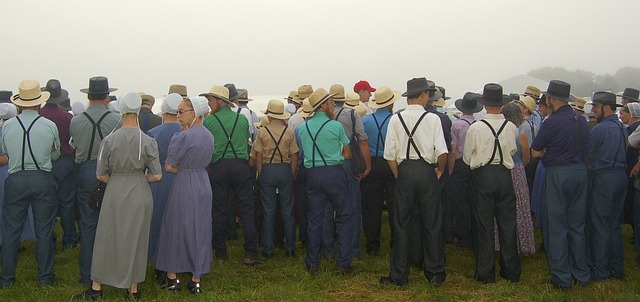The Amish, a traditionalist Christian group, have a unique way of life that sets them apart from mainstream society. One question that often arises is whether Amish individuals can have children. In this article, we will explore the topic of Amish individuals and their ability to have babies.
Table of Contents
Understanding the Amish Tradition of Family Planning
Can Amish have babies? It’s a question that may come to mind when thinking about the Amish community and their traditional way of life. The Amish are known for their simple living, strong sense of community, and adherence to traditional values. Family is at the heart of their culture, and having children is an important part of their way of life. However, the Amish approach to family planning is quite different from what many people are accustomed to.
Unlike the modern world, where birth control methods are widely available and used, the Amish do not typically use any form of contraception. Instead, they believe in leaving the number of children they have in the hands of God. They view children as a blessing and a gift from God, and they trust that He will provide for them.
This belief is rooted in their interpretation of the Bible, which emphasizes the importance of procreation and the sanctity of life. The Amish believe that it is their duty to bring children into the world and raise them in a way that honors God. They see large families as a sign of God’s favor and a testament to their faith.
In addition to their religious beliefs, the Amish also have practical reasons for not using contraception. They rely on their children to help with the work on their farms and in their communities. Having a large family ensures that there will be enough hands to help with the daily tasks and responsibilities. It also helps to strengthen the sense of community, as the Amish believe that children are a source of joy and unity.
While the Amish do not use contraception, they do practice a form of natural family planning. This involves tracking a woman’s menstrual cycle and abstaining from sexual intercourse during the fertile period. This method requires a great deal of self-control and communication between husband and wife. It is a way for the couple to be actively involved in the decision-making process and to be aware of the natural rhythms of a woman’s body.
It’s important to note that not all Amish couples have large families. Some may have only a few children, while others may have many. The decision to have children is a personal one, and it is ultimately up to the couple to decide how many children they will have. Factors such as health, financial stability, and the ability to provide for their children are taken into consideration.
In conclusion, the Amish approach to family planning is rooted in their religious beliefs and their commitment to living a simple, traditional way of life. They do not use contraception but instead trust in God to determine the number of children they will have. While this may seem unconventional in today’s world, it is a deeply held belief that is central to their culture and way of life. Whether they have a few children or many, the Amish view each child as a blessing and a gift from God.
Exploring the Role of Parenthood in Amish Culture

Can Amish have babies? It’s a question that may come to mind when thinking about the Amish community and their way of life. Parenthood plays a significant role in Amish culture, and having children is highly valued. Let’s explore the importance of parenthood in the Amish community and how it shapes their way of life.
In the Amish community, having children is seen as a blessing and a responsibility. Amish families typically have larger households compared to the average American family. This is because they believe that children are a gift from God and that it is their duty to raise them in a way that honors their faith and traditions.
The Amish view parenthood as a lifelong commitment. From the moment a child is born, they are surrounded by a loving and supportive community. The extended family, including grandparents, aunts, and uncles, all play a role in raising the child. This sense of community and shared responsibility helps to create a strong bond between family members and ensures that the child grows up with a strong sense of belonging.
One of the unique aspects of Amish parenthood is the emphasis on teaching children practical skills and values from a young age. Children are taught the importance of hard work, self-sufficiency, and humility. They learn how to care for animals, tend to crops, and contribute to the household chores. These skills not only prepare them for adulthood but also instill a sense of responsibility and discipline.
The Amish also place a strong emphasis on education within the family. While they may not attend traditional public schools, children are taught at home by their parents or within small community schools. Education focuses on practical skills, such as reading, writing, and arithmetic, as well as religious teachings. This ensures that children are well-prepared for their future roles within the community.
In Amish culture, the role of parents extends beyond the immediate family. The community as a whole plays a vital role in shaping the lives of children. Amish parents rely on the support and guidance of their fellow community members, who serve as role models and mentors. This collective approach to parenting helps to create a sense of unity and shared values within the community.
While the Amish value parenthood and the role it plays in their community, it’s important to note that not all Amish couples are able to have children. Just like in any other community, infertility can be a challenge for some Amish couples. However, the Amish community is known for its strong sense of support and compassion. Couples who are unable to have children often find solace and support within their community, and may even choose to adopt or foster children.
In conclusion, parenthood is highly valued in Amish culture. The Amish see children as a blessing and a responsibility, and they strive to raise them in a way that honors their faith and traditions. The sense of community and shared responsibility within the Amish community helps to shape the lives of children and instill important values from a young age. While not all Amish couples are able to have children, the community provides support and compassion for those facing infertility. Parenthood is a central aspect of Amish life, and it plays a significant role in shaping their way of life.
Challenges and Benefits of Raising Children in the Amish Community
Can Amish have babies? This is a question that often comes to mind when people think about the Amish community. The Amish are known for their traditional way of life, which includes living without modern technology and adhering to strict religious beliefs. But what does this mean for starting a family and raising children in the Amish community? Let’s explore the challenges and benefits of raising children in the Amish community.
One of the challenges of raising children in the Amish community is the lack of modern medical interventions during childbirth. The Amish prefer to have home births, with the assistance of a midwife or a trusted community member. This can be a daunting prospect for some, as they may worry about the safety of the mother and the baby. However, it’s important to note that the Amish have been successfully having babies for centuries, and they have developed their own methods and practices to ensure a safe delivery.
Another challenge is the limited access to formal education. The Amish believe in providing their children with a practical education that prepares them for a life of farming and manual labor. This means that formal education typically ends after the eighth grade. While this may seem restrictive to some, the Amish believe that this type of education is sufficient for their way of life. They prioritize teaching their children important life skills, such as farming, cooking, and woodworking, which they believe will serve them well in the future.
Despite these challenges, there are also many benefits to raising children in the Amish community. One of the biggest benefits is the strong sense of community and support that exists within the Amish society. Amish families live close to one another and often work together on various tasks, such as farming or building barns. This sense of community provides a support system for parents, as they can rely on their neighbors and extended family members for help and guidance in raising their children.
Another benefit is the emphasis on simplicity and family values. The Amish prioritize spending quality time with their children and teaching them the importance of hard work, respect, and humility. They believe in instilling strong moral values in their children from a young age, which helps to shape their character and guide them in making good decisions throughout their lives.
Additionally, the Amish community provides a safe and nurturing environment for children to grow up in. With limited exposure to modern technology and outside influences, Amish children are shielded from many of the negative aspects of the modern world, such as violence, materialism, and peer pressure. This allows them to focus on their family, community, and personal growth, which can have a positive impact on their overall well-being.
In conclusion, while there are challenges to raising children in the Amish community, such as limited access to modern medical interventions and formal education, there are also many benefits. The strong sense of community, emphasis on family values, and safe environment are all factors that contribute to the positive upbringing of Amish children. So, can Amish have babies? Absolutely! And they do so in a way that is rooted in tradition, faith, and a commitment to raising children who will contribute to their community and carry on their way of life.
Examining the Impact of Modern Medicine on Amish Childbirth Practices
Can Amish have babies? It’s a question that may come to mind when considering the unique lifestyle and beliefs of the Amish community. The Amish, known for their simple way of life and rejection of modern conveniences, have a distinct approach to childbirth that is deeply rooted in their religious beliefs. In this article, we will explore the impact of modern medicine on Amish childbirth practices and shed light on how the Amish community navigates the complexities of bringing new life into the world.
Childbirth is a natural and fundamental part of life, and the Amish recognize this. They believe that childbirth is a sacred event and view it as a blessing from God. For the Amish, childbirth is a deeply spiritual experience that is embraced with reverence and gratitude. They see it as a natural process that should be left in the hands of God, rather than relying on medical interventions.
In the Amish community, home births are the norm. Amish women typically give birth at home, surrounded by their families and a midwife. Midwives play a crucial role in Amish childbirth practices, providing support and guidance throughout the process. These midwives are experienced in delivering babies and are well-versed in the traditional methods used by the Amish.
The Amish approach to childbirth is rooted in their belief in the importance of maintaining a simple and natural way of life. They believe that relying on modern medicine for childbirth goes against their core values. Instead, they place their trust in God and the natural abilities of the human body. This belief extends to prenatal care as well, with Amish women often opting for minimal medical interventions during pregnancy.
However, it is important to note that the Amish are not completely opposed to modern medicine. In cases where complications arise during childbirth, they are willing to seek medical assistance. The health and well-being of both the mother and the baby are of utmost importance to the Amish community, and they recognize that sometimes medical intervention is necessary to ensure a safe delivery.
When medical intervention is required, the Amish typically turn to local hospitals or medical facilities that are familiar with their beliefs and practices. These facilities are often located within close proximity to Amish communities, making it easier for them to access the care they need while still adhering to their way of life. The medical professionals at these facilities are respectful of the Amish culture and work closely with the community to provide the necessary care while accommodating their beliefs.
In recent years, there has been a growing trend among some Amish communities to embrace certain aspects of modern medicine, particularly when it comes to prenatal care. This shift is driven by a desire to ensure the health and well-being of both the mother and the baby. Some Amish women now opt for ultrasounds and other prenatal tests to monitor the development of their babies and detect any potential complications early on.
In conclusion, while the Amish community generally prefers a natural and home-based approach to childbirth, they are not opposed to seeking medical assistance when necessary. The Amish view childbirth as a sacred event and place their trust in God and the natural abilities of the human body. However, they also recognize the importance of ensuring the health and well-being of both the mother and the baby, and are willing to seek medical intervention when complications arise. The Amish community’s approach to childbirth is a reflection of their deeply held beliefs and commitment to maintaining a simple and natural way of life.
Conclusion
Yes, Amish individuals can have babies.
For licensing reasons, we must provide the following notice: This content was created in part with the help of an AI.


